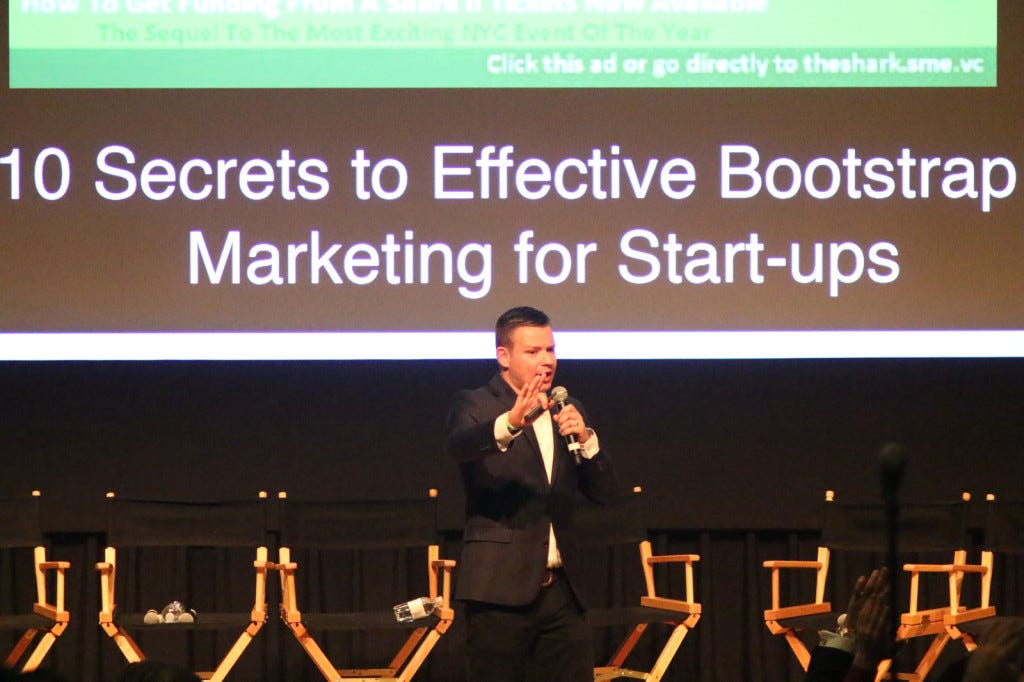I lived in Poland until the age of 23. I moved to New York 10 years ago, where I’ve led several lives: construction worker, scaffold operator, waiter, office manager, digital marketer, consultant, corporate trainer, entrepreneur, professional speaker, professor and executive. In that order.
I never really intended to get involved in public speaking until a couple of years ago when my life took a dramatic turn: I was out of a job and struggled to make ends meet as an entrepreneur. For the first time in my life I was overexposed to debt and new contracts were slow to get signed.
I was looking for new ways to gain exposure and expand my network. I researched successful entrepreneurs in my industry, those I wanted to emulate, and came to one simple conclusion: Successful people are confident public speakers.
I was not comfortable speaking in front of large audiences. And, I was keenly aware of my thick Polish accent. English is my second language, so I never really believed I could become an effective speaker in America. The only way I could keep the audience captivated — I believed—was the entertainment value of watching me embarrass myself.
Don’t miss: How to get your creative juices flowing
The anxiety from deciding to become a public speaker was significant, but weighing that against the anxiety of not overcoming my situation was far greater. I have always lived my life by failing forward and have never walked away from a challenge, realizing early on in my career that invisibility is a fate much worse than failure.
Public speaking has allowed me to take my career to an entirely new level, with access to people and places I never had before.

I don’t claim to be a public speaking guru or a particularly gifted orator, but I have delivered a number of memorable keynotes, training seminars, and talks around the globe, including places such as London and Vienna.
Public speaking created opportunities for me I never knew existed
Public speaking leads to wealth. It will help you build your network and relationships. It will help you get new business, job offers and increase your social media presence.
Most people are not comfortable speaking in front of a larger audiences. An article on entrepreneur.com lists that 74 percent of adults suffer from speech anxiety, according to the National Institute of Mental Health.
I am certainly one of them. I get anxious every single time I get on a bigger stage or in front of a camera. I think most people do.
Taking a pro-active approach to developing your oratory and public speaking skills can boost your confidence quickly. As your speaking confidence multiplies you will be less worried about addressing any sized audience.
Before my first larger public speaking appearance, I read How to Develop Self-Confidence by Public Speaking by Dale Carnegie, which made me realize one simple truth about public speaking: It’s not about you, it’s about your content.
Take a baby-step approach to developing your confidence. I started by connecting with my former Professors and offered to guest lecture.
My first public speaking gig was an event hosted by the International Association of Business Communicators (IABC). I was terrified to speak publicly for the first time in front of several hundred professional communicators.
I did my best to prepare. I invited amazing, much more accomplished speakers to join the panel which I moderated. I did a very thorough job researching my questions and working with the panelists.
The event was a big success for me not because I wowed the audience, but because I was able to create great content by brining together exceptional experts in the field. Take a similar approach to take some of the pressure off your chest. Teamwork makes the dream work.
One of the highlights of this experience was that a former President of the IABC NY Chapter, who was in attendance, later referred me to NYU where I now teach as an Adjunct Professor.
Here are a couple of tips to improve your public speaking game that have worked for me when I was getting started.
Know your topic inside out
Ken Linder notes on entrepreneur.com that “if you talk about things you know and are passionate about, that resonates with people.” He also mentions that you know more about your topic than your audience so it’s your job to educate them.
Confident speakers develop their expertise by knowing their topic thoroughly. Study your discipline to become well-versed in this area. The work you put in researching the topic will be noticed and appreciated by your audience. Avoid picking topics that you don’t feel strongly enough for at any cost — it’s a sure way to ruin your self confidence.
Confident public speakers deliver convincing arguments by absorbing as much relevant knowledge as possible. Read, study, and memorize key concepts. Accumulate interesting facts, stories, quotes, and examples.
Those activities will boost your faith in self because you will have a richer and more interesting content to present.
Prepare yourself by practicing
No successful public speaker became famous without doing their homework and preparation. The best prepared themselves by speaking for hours in front of mirrors or for a few select friends. Some renowned speakers simply speak in an empty room to hone their skills.
Toastmasters International suggests practicing with a timer and allowing time for the unexpected. Unforeseen events can distract unprepared, nervous speakers.
 Visualize yourself delivering an inspiring speech to prepare yourself. Rehearsing the speech in your mind creates a type of dry run which increases your confidence for the actual speech.
Visualize yourself delivering an inspiring speech to prepare yourself. Rehearsing the speech in your mind creates a type of dry run which increases your confidence for the actual speech.
Do not skip this step.
Use eye candy and power wording
Using eye candy like slides, colorful images, graphs, videos and headline heavy copy draws your audience’s attention like a magnet. It also takes away pressure and attention from your actual delivery. Draw your audience’s attention from you to your content.
Even the most dynamic speakers use imagery to keep audiences on their toes. Focus on the task at hand. You want to inspire, inform and entertain by delivering a high energy message. Check out the deck below for examples on how to combine magnetic headlines with engaging images.
Audience members want to use the content being presented for their benefit. Make dramatic statements to convey your message convincingly. Pepper your speech with power verbs to inspire audiences. Here is another example:
Using effective wording and enticing imagery requires strict planning. Do spend as much time as you can sprucing up your presentation to become a confident public speaker.
Enter with boldness
Boldness and hesitation will elicit very different responses from your audience. Hesitation creates obstacles in your path to captivate your audience. Boldness eliminates them.
Start your talk with boldness to appear larger and more interesting—the first impression is critical. Play a video. Tell a rehearsed story or a joke. Make a bold statement about the material you will cover. Don’t start with agenda—that’s boring.
Entering the stage with boldness will also have a magical effect of camouflaging your inexperience and oratory deficiencies. Boldness gives you presence while the timid fade into wallpaper.
Learn from your favorite public speakers
Study from the best to improve your confidence. Follow your favorite public speakers on social media, and sites like SlideShare. I also watch Ted videosto learn from the best speakers in the world.
Attend live events to learn from and emulate your favorite speakers. Observe how they use their hands to add emphasis to key points. Note how they raise and lower their voice to keep you focused on their message. The best public speakers are masters of inspiring an audience. Study their movements and delivery style to feed off of their confidence.
Develop faith in yourself by observing speakers who ooze with confidence and charisma.
Be open to receiving positive and negative feedback
Both positive and negative feedback can improve your confidence. One of the most painful experiences is when I watch a recording of my myself speaking publicly. Although I am uncomfortable every single time I view my speaking performance, I push myself to do it to pick up all the ‘ummms’ and the ‘you knows.’
Watch yourself on video. Observe your overall delivery. What seemed to rouse the audience? How can you improve? Watching yourself from a third person perspective can accelerate your growth quickly.
Negative reviews help you pinpoint areas for improvement. Even though negative feedback might sting your ego, these points of view usually boost your public speaking skills in the long run. It’s worth it.
Being open to criticism helps you to develop thick skin. Even the best public speakers get negative feedback at times. Grow your confidence from both positive, inspiring feedback and negative, constructive feedback to build your confidence.
Speak less to say more
Speak fewer words to power up your message. Brilliant public speakers use words economically to make an impact. Remove all ‘ums’ and unnecessary fillers. Respect your time and the time of your audience. Avoid hesitating unless you want the audience to reflect on some point.
Stick to your speech plan. Refrain from adding points on the fly. Speak on your desired topic only. Do not add extra examples and stay away from straying off course.
Public speaking changed my life. I hope it will change yours. I hope to see you speak at the next conference!
Source : http://thenextweb.com/lifehacks/2014/06/20/become-confident-public-speaker/
Tidak ada komentar:
Posting Komentar